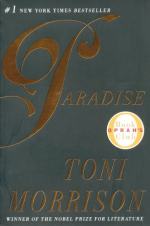|
This section contains 5,592 words (approx. 19 pages at 300 words per page) |

|
Paradise continues, and in some ways completes, Toni Morrison's reflection on the journeys to escape from slavery's heritage that began with Beloved (1987, see separate entry). This novel's cultural myth is the narrative of a group who tried to escape from post-Reconstruction culture, not by heading for the city, but—in the words of Mark Twain's, and the nineteenth century's, great American protagonist Huck Finn—by "lighting out for the territory."
Ironically, these black pioneers, the revered ancestors of the characters in Morrison's novel, emulated the migration that settled the American West, following the advice of the white editor of a New York newspaper, to "Go West, young man." In their search for a Utopian alternative to institutional racism, the trailblazers had to contend not only with the enemies they shared with the other settlers (Native Americans trying to preserve their territories and cultures, wild...
|
This section contains 5,592 words (approx. 19 pages at 300 words per page) |

|




